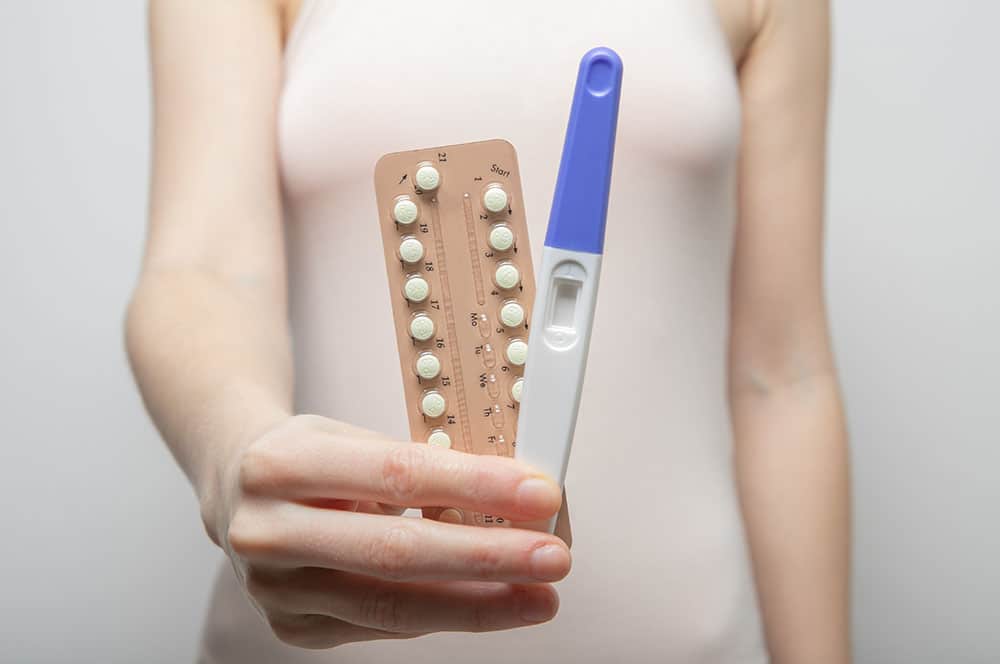Yes, it is possible to get pregnant while taking contraceptives. Despite being one of the most effective methods, the pill is not 100% safe.
Getting straight to the point, yes, it is possible get pregnant while taking birth control. The contraceptive pill is made up of hormones to prevent ovulation from occurring, and therefore preventing pregnancy. However, despite being one of the most common and effective methods, the pill is not 100% effective. In fact, the effectiveness decreases significantly with inappropriate use of the medication.
Therefore, although it is not very common, it can happen that a woman becomes pregnant while using contraceptives. After all, most contraceptives are around 99% effective, so it is expected that 1 in every 100 women can get pregnant, even when using the pill correctly.
Therefore, To avoid unwanted pregnancy as much as possible, the ideal would be to use contraceptives correctly, as well as condoms.which in addition to preventing fertilization, also prevents sexually transmitted diseases.
Is it possible to get pregnant while taking contraceptives?
As we mentioned above, yes, it is quite possible to get pregnant while taking contraceptives. To understand how this is possible, we need to know more about contraceptives.
The pill works by means of certain hormones that serve to prevent ovulation from happening, which is what would result in pregnancy. But, as is common knowledge, the pill does not offer 100% effectiveness in preventing pregnancy, even if used correctly as suggested in the leaflet.
In the specific case of the pill, in theory, its effectiveness is 99.7%, that is, less than 1 in every 100 women would become pregnant with the method. However, this effectiveness can be drastically reduced if the pill is used inappropriately. For example, forgetting to take it one day or another, taking it at irregular times or even taking other medications.
In fact, if you think you are pregnant despite using contraceptives, the recommendation is to take a pregnancy test urgently. So, if the test is positive, you should stop taking the pill and consult your gynecologist to begin monitoring your pregnancy.
What reduces the action of contraceptives?
As previously stated, some factors can reduce the effectiveness of contraceptives, increasing the chances of an unplanned pregnancy. Let’s see below what reduces the effectiveness of the method.
1. Forgetting to take the pill
This is one of the most common mistakes, forgetting to take your contraceptive one day. This reduces the effectiveness of the method and increases the chances of getting pregnant, as hormone levels can vary due to lack. Furthermore, if you forget to take the pill in the first week of the pack, the risk is even greater, as ovulation may occur earlier.
So, if you forget to take the pill one day, the recommendation is to take it as soon as you remember and then take the next day’s pill at the usual time.
2. Repeatedly forgetting
Now forgetting more than once during the same month increases the risk of pregnancy even further. So, in these cases, the ideal is to use condoms throughout the month, until you start a new pack. In fact, if adherence to contraceptives is a recurring problem, you should talk to your doctor to find another contraceptive method. Other options include injection, hormonal patch, hormone implant, or IUD.
3. Irregular hours
In general, pill contraceptives are designed to be replaced every 24 hours. Therefore, to maintain its effectiveness, it is essential to always take it at the same time, so as not to have variations in hormone levels in the body. After all, this considerably increases the risk of ovulating and possibly getting pregnant.
So, the tip is to set an alarm clock or daily reminder to take your contraceptive. If you delay too long, to protect yourself, the ideal is to use a condom for the next 7 days.
4. Changing contraceptives
Changing from one contraceptive to another requires care and medical advice. After all, each medication has different compositions and changes can alter hormone levels in the body, which can increase the chances of ovulation. Therefore, the recommendation is to use an additional contraceptive method in the first 2 weeks of the change.
5. Incorrect storage of contraceptives
This can also affect the effectiveness of the pill and increase the chances of getting pregnant while taking birth control. So, the best thing to do is to store the card at a temperature between 15 and 30 degrees, free from humidity, that is, don’t store it in the bathroom or kitchen. Furthermore, it is essential to keep the pills in their original packaging.
6. Diarrhea or vomiting
Having an episode of diarrhea or vomiting about 3 or 4 hours after taking the pill, or for 48 hours or more, considerably reduces the absorption of the pill, consequently, increasing the chance of getting pregnant. So, in this specific case, the recommendation is to continue taking the pill as usual, but using a condom as an extra contraceptive method.
7. Use of other medicines
Some medications may end up interfering with the effectiveness of the contraceptive pill. Depending on the medicine, it can reduce or even cut the effect of the pill. Antibiotics such as rifampicin, rifapentine and rifabutin, which are indicated for the treatment of tuberculosis, leprosy and meningitis, reduce the effectiveness of the contraceptive.
In these cases, the ideal is to use an extra contraceptive method, ideally a condom, to avoid the risk of becoming pregnant.
8. Consumption of alcoholic beverages
No, alcohol does not necessarily interfere with the effectiveness of contraceptives. What happens is that when you drink, there is a greater risk of forgetting to take the pill, or taking it at the wrong time, which, as we have seen, reduces its effectiveness. Furthermore, if you drink too much and vomit afterwards, this will also reduce the effectiveness of the contraceptive.
Can I get pregnant while taking birth control and breastfeeding?
Yes, the idea is the same. For example, there is the progesterone contraceptive pill, Cerazette, which is recommended for use during breastfeeding. Just like the common pill, it is also 99% effective, meaning it is not completely safe. Check out the best contraceptive options for breastfeeding women.
So, if you forget to take your contraceptive for more than 12 hours, or if you are taking antibiotics, you may get pregnant, even if you are breastfeeding. Therefore, it is always recommended to use an extra contraceptive method, such as a condom.
READ MORE:
Bibliography:
Sources: Dr. Igor Padovesi Vitat Rio Norte Saúde Tua Saúde

Sign up for our newsletter and stay up to date with exclusive news
that can transform your routine!
Warning: Undefined array key "title" in /home/storelat/public_html/wp-content/plugins/link-whisper-premium/templates/frontend/related-posts.php on line 12
Warning: Undefined array key "title_tag" in /home/storelat/public_html/wp-content/plugins/link-whisper-premium/templates/frontend/related-posts.php on line 13




